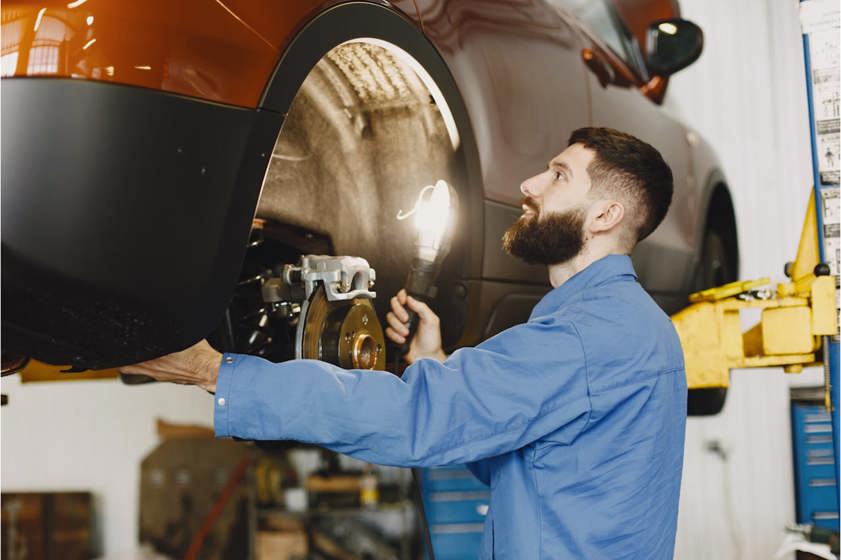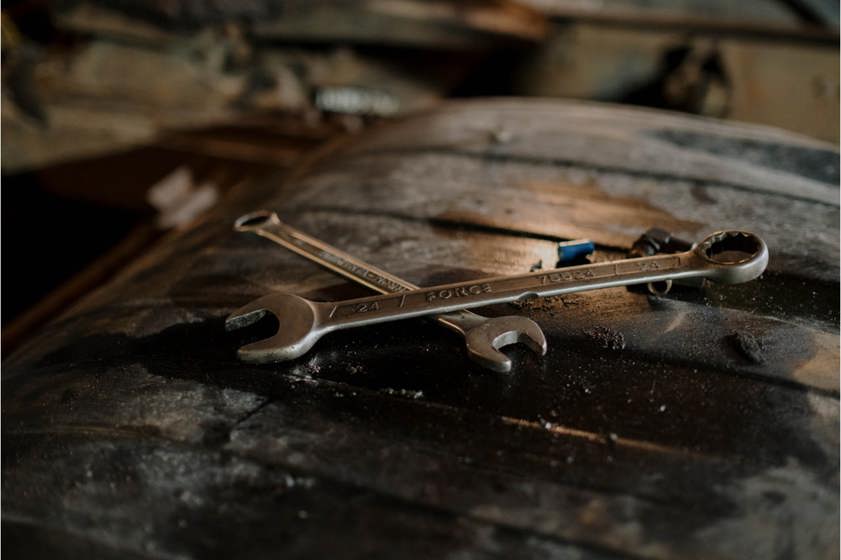
Your car’s braking system is undoubtedly its most critical safety feature, and like other car systems, it needs a bit of TLC from time to time.
Knowing how and when to replace your brakes not only ensures your safety, but also extends the lifespan of your vehicle.
Despite this, many drivers are unsure about identifying worn-out brakes or understanding the replacement process.
In this blog, we’ll explain everything you need to know about brake maintenance, including signs of wear, when to replace, and the importance of regular servicing.
We discuss:
Brake pads are the main component of your brakes and typically last between 25,000 to 70,000 miles, but their lifespan depends on a couple of factors:
- Driving habits - Aggressive acceleration and braking can cause the pads to wear out faster.
- Environment - If you live in a city with a lot of stop-start traffic, that will be more taxing on your brake pads when compared to motorway driving.
- Type of brake pad - Organic brake pads wear out quicker than ceramic or semi-metallic ones.
For example, the brakes last much longer on electric and hybrid vehicles as they use the electric motor to help with braking, known as ‘regenerative braking’.
Your brakes provide the stopping power that prevents accidents and ensures you remain safe on the road.
Over time, components like brake pads and discs wear out due to friction and heat. Ignoring these signs can lead to longer stopping distances, increased wear on other parts, and potential safety risks. Not just for you, but for other road users.
Knowing when to replace your brake pads is crucial. Look out for these warning signs:
- Car brakes squeaking - High-pitched squeals every time you use the brakes.
- Grinding noises - A metallic grinding sound means your brake pads are worn, and the discs are being damaged.
- Vibration when braking - This can be caused by warped brake discs.
- Longer stopping distances - This indicates reduced braking efficiency.
- Brake warning light - Most modern cars have dashboard indicators for your brakes.
The great thing about modern cars is that they know themselves when something is wrong and will display a dashboard warning light, such as a brake warning light. If one appears, you should investigate the matter and get it fixed.
If you’ve got a vehicle maintenance contract with your lease deal, your brakes are given a full inspection. This is included in your monthly price as part of your annual servicing.
While brake pads are replaced more frequently, brake discs also require attention. They typically last 50,000 to 70,000 miles, but this varies depending on usage and your car.
You should replace your brake discs if:
- They’re thinner than the manufacturer’s recommended thickness (this will be in your car’s handbook).
- They have visible grooves, cracks, or warping.
We recommend replacing both your brake pads and discs together. This will ensure consistent performance and save you money.

Replacing brake pads involves several steps and tools, and we would definitely recommend getting it completed by a professional.
However, if you want to do it yourself, here’s the process:
- Ensure the car is parked on a flat surface.
- Use a jack and ensure the car with jack stands.
- Remove the wheel, this gives access to the brake assembly.
- Check the condition of the pads, discs, and calipers.
- Remove the old pads and fit the new ones, ensuring they are aligned.
- Reattach the wheel and lower the car.
- Ensure the brakes are properly working before driving.
If you have opted for a maintenance contract with your lease deal, this will be included as part of your regular servicing.
According to Checkatrade, it costs somewhere better £189 and £276 for brake pad and disc replacement. This is obviously expensive and routine brake inspections can avoid this.
A professional service can:
- Identity signs of wear and tear.
- Prevent costly repairs.
- Ensure you drive a safe car.
Brake discs work alongside brake pads to create the friction needed to stop your car. If your brake discs are worn, it can lead to uneven braking and increase wear on tear on new brake pads.
Signs like these suggest your brake discs need replacing:
- Vibrations when braking.
- Discoloration of the disc from overheating.
- Deep grooves or cracks on the surface.
Handbrake
The handbrake, also known as a parking brake, is essential in keeping your vehicle where it is when you’re not moving. It prevents your car from rolling, especially if parked on a hill or uneven terrain.
It’s worth noting that handbrakes come in two types: manual and electronic parking brakes (EPB).
When to check and replace your handbrake:
- If your handbrake feels loose or requires lots of pulling to engage.
- If it actually stops holding the car stationary, i.e. the car still rolls.
- Always check the handbrake during regular brake maintenance.
Anti-lock braking systems (ABS)
Anti-lock brakes are a feature that most new cars come with, but what actually are they? It’s a feature designed to prevent your wheels from locking up when braking and goes a long way in preventing skidding, which is essential in slippery road conditions.
The system works by monitoring if the wheels are about to lock. If they sense this is the case, ABS will modulate brake pressure automatically and allow the wheels to maintain traction. Clever, isn’t it.
If you notice any faults, such as an ABS warning light or reduced efficiency when braking, seek help from a professional mechanic.
Understanding how and when to replace your brakes is essential for staying safe on our roads.
By staying vigilant about signs of wear and committing to regular maintenance, you can go a long way to ensuring peace of mind on the road.
Remember, if you are ever unsure about your brake pads, consult a professional mechanic.
NOTE: If there’s an issue with your brakes on your lease vehicle, you must service it as advised by the manufacturer. If you want to get the work done at a local garage, it must be a VAT-registered garage. For more, check out our Servicing Your Lease Vehicle guide.
Looking for more maintenance advice? Nationwide Vehicle Contracts has a load of content to help keep you on the roads, including Winter Car and Van Care and Replacing the Tyres on a Lease Vehicle.
We are also one of the UK’s largest car leasing brokers, offering a range of deals to suit your every need. For more information, call us on 0345 811 9595 or check out our latest deals.
Originally posted: 15th January 2025

